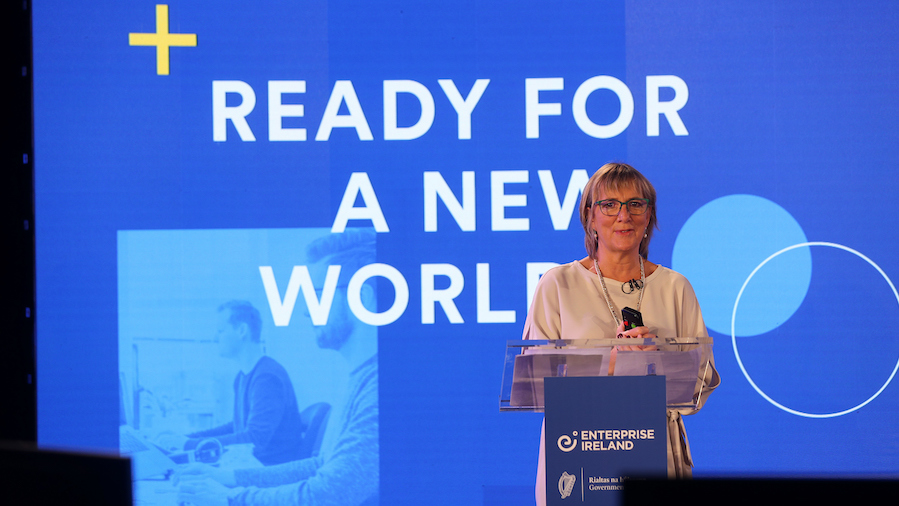Enterprise Ireland is that country’s government organization responsible for the development and growth of Irish enterprises in world markets and is the lifeblood of the thriving Irish tech scene.
Subscribe to the Crunchbase Daily
Started 20 years ago, the organization now has 40 offices all over the world and supports companies working together on innovation and entrepreneurship. One of its goals is to support the start, growth, innovation and acquisition of export sales in global markets to support sustainable economic growth, regional development and secure employment.
Just a few of the companies supported by Enterprise Ireland include:
- Taoglas: real-time social distancing and capacity compliance analytics;
- Kitman Labs: data analytics for sports players; and
- SilverCloud Health: digital mental health provider.
EI is also the second-biggest seed investors in the world by deal count, while Ireland itself is the fifth-biggest exporter of COVID-19 related goods behind the U.S., Germany, Switzerland and China, according to the Organization for Economic Cooperation and Development.
Most of these exports are digital and technology in nature and from companies largely supported by Enterprise Ireland. And interestingly, the country has a population of fewer than 5 million.
Enterprise Ireland’s CEO Julie Sinnamon spoke to me about how Ireland has fostered such a strong tech sector, and the role of EI within that community and the country’s digital exports. The following was lightly edited for length and clarity.
Digital technology is one of Ireland’s largest exporting sectors. Can you explain more about what that means?
Sinnamon: We support 125 new startups each year, and nearly two-thirds are in the information and communication technologies (ICT) side, including digital technologies. We have been successful in attracting large ICT companies and medical technology companies, and those we support are the fusion between those sectors. Those include providing apps and COVID tools for supporting projects in those spaces. For example, when COVID hit, NearForm pivoted and developed a contract tracing app that has been a success in the U.S. and Europe. Another is Daon, which developed biometrics to aid when passengers and employees go through airports.
How has Ireland fostered such a strong tech sector?
Sinnamon: On one side, there is a group of large, multinational companies to help develop the skill sets. On the other, the government has a strong commitment to research and innovation. Even through the financial crisis, they were committed to invest in R&D. Ireland is not a low-cost economy, so innovation is key as is investment to R&D and the attraction to tech companies. We work closely with universities to maximize the spin-outs, which is where we get the most disruptive technology. Two years ago, the government launched a disruptive innovation fund. That is something we are trying to foster. It doesn’t matter which party is in power in Ireland, there is a pro-business stance.
What unique perspective does Enterprise Ireland bring to that community?
Sinnamon: We have a 350 million euro budget each year and invest in seed funds as well as direct investing. We developed the ecosystem and venture funds in the country, which is why having a network of 40 offices overseas is so important to bringing in market intelligence every day. We are a small country, so innovative startups live next door to large companies. Both types of companies are working together along with the government’s disruptive technology fund. It is designed to force that working collaboration between the large and small.
How has the global pandemic affected the tech scene there?
Sinnamon: The 13th of March 2020 was the last day working in the office in Ireland. We moved to remote, which has had an impact in terms of how we operate, but Irish companies were also not able to go into other countries. No one visiting was a great leveler. Instead, we were building virtual relationships and doing business globally. There were more onshoring opportunities. Suddenly, we had to be self-sufficient, make things ourselves and send them out. A lot of companies were keeping their heads down.
What sectors within technology are gaining venture capital investor attention?
Sinnamon: Sectors, such as ICT, are a large part of the investments. Medical technology is always strong with the multinational companies here. We tend to find deep technology and that is what is being exported based on that. One area we’ve had a specific focus on is female entrepreneurs. There is a lack of female entrepreneurs globally in technology. In 2011, 7 percent were female in Ireland, and globally, it was 8 percent. We are now up to 24 percent, but global, it is still 8 percent. We are putting a focus on role models, and there is a great momentum.
Photo of Julie Sinnamon, CEO of Enterprise Ireland, courtesy of the organization
Blogroll illustration: Li-Anne Dias

Stay up to date with recent funding rounds, acquisitions, and more with the Crunchbase Daily.



![Illustration of a man sitting on a huge pile o' money. [Dom Guzman]](https://news.crunchbase.com/wp-content/uploads/Giant_Funding-470x352.jpg)





![Illustration of Harris and Trump: 2024 presidential election candidates. [Dom Guzman]](https://news.crunchbase.com/wp-content/uploads/Election-2024-300x168.jpg)

67.1K Followers